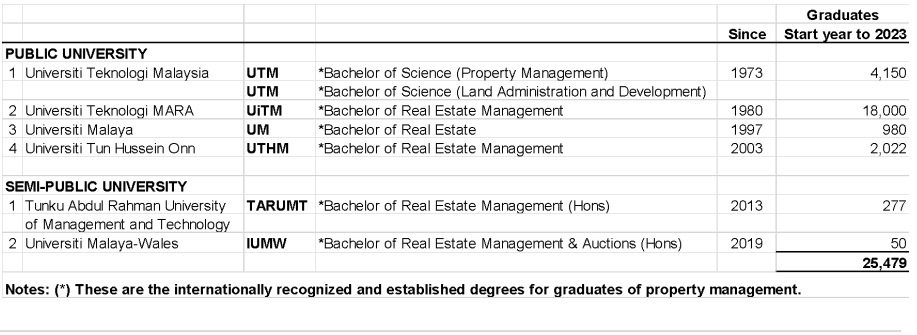
Below is a letter addressed to Minister of Housing and Local Government Nga Kor Ming which has been reproduced without edits.
SUBJECT: OBJECTION TO THE PROPOSAL FOR A NEW REGULATORY BOARD FOR BUILDING MANAGERS BY THE MINISTRY OF HOUSING AND LOCAL GOVERNMENT (KPKT), MALAYSIA
We are a coalition of professionals representing the following institutions in Malaysia, all of which are directly involved in the management and maintenance of buildings: -
1. Malaysian Institute of Property and Facility Managers (MIPFM);
2. Royal Institution of Surveyors Malaysia (RISM);
3. Association of Valuers, Property Managers, Estate Agents, and Property Consultants in the Private Sector, Malaysia (PEPS);
4. Institute of Malaysian Property Agents and Consultants (IMPAC);
5. Persatuan Penilai Sektor Awam Malaysia (PENILAISAMA); and
6. Persatuan Pegawai Penilaian Pihak Berkuasa Tempatan Malaysia (PEPAM).
We are aware of the Ministry of Housing and Local Government's (KPKT) proposal to establish a new regulatory board for building managers.
On behalf of our members, we write to express our strong disagreement with this proposal and to voice our growing concerns, as outlined below:
1. Formal objection to KPKT’s proposal
We wish to convey to YB our collective and unanimous objection to the proposal for establishing a new regulatory board for building managers. This proposal undermines the existing well-established property management regulatory framework that has effectively governed the profession for over four decades. It would result in unnecessary duplication, potential inefficiencies in property management oversight, and a waste of public funds.
2. Existing legislation and regulatory framework
The profession of Property Management Practice by property managers has been rigorously regulated by the Board of Valuers, Appraisers, Estate Agents, and Property Managers (LPEPH) under the Ministry of Finance Malaysia since 1981. This regulation is grounded in the Valuers, Appraisers, Estate Agents, and Property Managers Act 1981 (Act 242) and its subsequent 1986 Regulations. The long-standing presence and effectiveness of this framework have ensured that property management is treated as a professional career, supported by stringent standards, regulatory oversights, higher education qualifications and continuous professional development in property management. The Act 242 framework remains relevant, comprehensive, and capable of addressing all aspects of property management across the nation, including in East Malaysia. The role of Property Manager registered under Act 242 is by default recognized or amplified in Act 757.
3. Historical context and inclusive approach by LPEPH
In 2018, LPEPH demonstrated its commitment to inclusivity by opening a 12-month registration window for experienced building managers without formal qualifications. This allowed them to obtain licenses without academic qualifications or passing the test of professional competence, provided they met LPEPH's entry requirements for the aforesaid window opening period. This proactive measure was a direct response to concerns raised in 2017, when some parties sought to redefine property management as a business venture rather than a profession, arguing that many experienced but unqualified building managers were excluded from LPEPH registration. This inclusive approach also ensured representation within the board for organizations such as Real Estate and Housing Developers’Association Malaysia (REHDA) and Malaysia Shopping Malls Association (PPK), alongside established professional associations. LPEPH’s initiative provided a balanced solution, addressing concerns without compromising the profession’s integrity or the public interest. It effectively mitigated the issue of unregistered property managers while maintaining centralized, professional oversight under LPEPH.
4. Educational institutions and professional development
Property management, including building and facility management, is unequivocally a professional career. This is evidenced by the numerous local universities and higher education institutions — such as UITM, UTM, UM, UTHM, UTAR, and INSPEN—that offer specialized diploma, bachelor's, and postgraduate courses in Property Management, also known as Estate Management. These institutions have produced over 31,702 graduates (with degrees, diplomas, and certificates) to date, who meet the industry’s workforce demands. After gaining the requisite experience, these graduates undergo a rigorous test of professional competence before qualifying as Registered Property Managers under LPEPH. Currently, 2,290 Property Managers are registered with LPEPH. This professional pipeline underscores the robustness of the current regulatory framework and the lack of necessity for establishing a new board.
Why does KPKT want to waste public funds by disregarding the higher education system in property management, which has been established since 1973? Over 25,000 degree graduates have been produced by local public and semi-public universities alone, not including those from private universities in Malaysia and those who graduated from overseas.

Academics in this discipline are trained and developed both locally and internationally. INSPEN, a national training institute, was established using federal funds to provide semi-professional and technical training in property management.
5. Waste of public funds
The proposal to establish a new regulatory board is redundant and fiscally irresponsible. LPEPH has successfully regulated registered property managers and professional property management practices for over 43 years, overseeing the entire spectrum of real estate management, including stratified and non-stratified developments across residential, commercial, retail, and industrial properties. Creating a new board would not only duplicate existing efforts but also waste public resources, especially when Act 242 remains a relevant and comprehensive legislative instrument.
Moreover, as highlighted in past discussions, the idea of licensing strata property managers under the Commissioners of Buildings (COBs) is particularly ill-conceived. The decentralized nature of COB oversight across different states, especially in areas where COBs do not exist (e.g., Sabah and Sarawak), would lead to inconsistent regulation and potential lapses in professional standards.
6. Recognition in the Mid-Term Review of the 12th Malaysia Plan
The vital role of Registered Property Managers in managing stratified developments was explicitly recognized in the Mid-Term Review of the 12th Malaysia Plan by the Prime Minister. This acknowledgement underscores the critical role these professionals play in ensuring the efficient management and sustainability of stratified developments across the country. It is evident that the existing framework under LPEPH is both effective and essential, and does not warrant the introduction of a new, potentially disruptive board.
7. Strengthening existing collaborations
The existing collaboration between LPEPH Registered Property Managers and the Commissioners of Buildings, many of whom hold qualifications in property management and are themselves Registered Property Managers, has long been a cornerstone of effective property management in Malaysia. This partnership has consistently delivered high standards of service and has contributed significantly to the stratified development industry. Rather than creating a new board, efforts should be focused on strengthening this collaboration, ensuring that it continues to serve the public interest without unnecessary duplication or wasteful expenditure of public funds.
8. Conflict of interest and BMAM’s involvement
Building Management Association of Malaysia (BMAM), which represents a significant number of major developers, has a clear conflict of interest in pushing for a new regulatory board for building managers. More often than not, developers have direct interests in the management of properties, especially during the initial phases after construction. BMAM has been a vocal advocate for the creation of a new regulatory board under KPKT. Allowing them to influence the regulation of property managers raises concerns about impartiality, the protection of public interest, and the potential for compromised standards. The existing regulatory framework under LPEPH already provides sufficient oversight to ensure professional standards and public accountability, without the need for a new board that might cater to specific developer interests.
The involvement of BMAM in promoting this proposal suggests an agenda that may prioritize the interests of developers over those of property owners and residents. This conflict of interest underscores the importance of maintaining the existing centralized and independent regulatory framework under LPEPH, which has no ties to commercial developers and is solely focused on upholding professional standards and protecting the public interest.
9. Rebuttal of allegation of monopoly by valuers / valuer property managers
It has been alleged that the current regulatory framework for property management under LPEPH constitutes a monopoly by Valuers. However, under Act 242, all property management services are provided by Registered Property Managers through registered property management firms. Valuers themselves do not offer property management services. Therefore, there is no monopoly of Valuers in the property management industry. Additionally, the designation of "Valuer Property Manager" does not exist under Act 242. The allegation is baseless, misleading, and entirely without merit.
The claim of monopoly overlooks the fact that LPEPH’s regulatory structure is inclusive and open to all qualified individuals. Anyone who meets the required educational qualifications and successfully passes the professional examination is eligible for registration as a Property Manager under LPEPH. This process is designed to ensure that only those who have demonstrated the necessary knowledge and competency are allowed to practice, thereby safeguarding the public interest.
Moreover, LPEPH’s framework includes representatives from various sectors, such as REHDA and PPK, ensuring that the regulatory process remains balanced and reflective of the industry’s diverse stakeholders. Therefore, the allegation of monopoly is not only baseless but also disregards the open, merit-based registration process that is fundamental to maintaining professional standards in property management. The rigorous standards upheld by LPEPH are necessary to maintain the integrity of the profession, rather than a means of monopolistic control.
10. Property managers, building managers and professional property management practice
It is crucial to emphasize that registered property managers also include those building managers who are registered as property managers by LPEPH. Under this system, the professional property management practice is where a registered property manager provides property management service to a client for a fee through a licensed property management company that is also regulated by LPEPH, ensuring that all activities are conducted according to the highest professional standards.
This approach not only ensures that property management services are offered by qualified and competent individuals but also provides a clear regulatory framework for accountability. This framework is designed to protect the interests of clients and the public, ensuring that property management services are delivered with professionalism and integrity. Establishing a new regulatory board would disrupt this established and effective system, creating unnecessary confusion and fragmentation in the industry.
By maintaining the regulation under LPEPH, all property managers, including building managers, continue to operate under a unified standard that upholds the profession’s integrity and ensures that public interests are safeguarded.
11. Majority of complaints in the stratified developments
The majority of complaints received by LPEPH and the Commissioner of Buildings (COB) involve unregistered property managers and the misuse of power by Joint Management Committees (JMCs) and Management Committees (MCs). These complaints highlight the ongoing challenges within the industry that stem from unqualified individuals attempting to manage properties without proper oversight. Establishing a new regulatory board will not address these core issues; rather, it risks diluting the enforcement capabilities of the existing framework, potentially exacerbating the problem. Strengthening the existing system under LPEPH, which already has a proven track record of dealing with these issues, is the more prudent approach.
In the Mid-Term Review of the 12th Malaysia Plan, the Prime Minister has expressed the need to amend the Strata Management Act 2013 (Act 757) to reinstate the role of Registered Property Manager under the Valuers, Appraisers, Estate Agents, and Property Managers Act 1981 (Act 242) so as to close the gate for unregistered property manager to be appointed by Joint Management Bodies (JMBs) and Management Corporations (MCs).
We truly appreciate your wisdom to understand the issue and, should Yang Berhormat need further clarification and information, kindly contact our Secretariat at 03-79601261 / 019-6008022 or email: [email protected].





